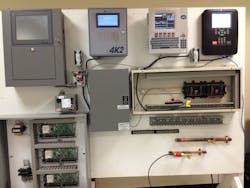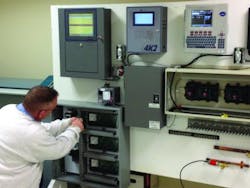Contractors See Impact of Controllers on Business
The HVACR industry has been slow to adopt electronics in comparison to other industries, but the benefits of new and innovative products are driving change that helps everyone involved in the service channel. One such
advancement, the transition from mechanical to electronic pressure controls on condensing units, was covered last month (bit.ly/PSI_Control).
As we continue to explore how this transformation is affecting the HVACR industry, we turned directly to HVACR contractors and asked them to weigh-in.
Richard Luhm, president, Memphis Mechanical Services describes how electronic technology is improving efficiency and convenience, and helping to reduce costs for customers. Memphis Mechanical, located in Memphis, TN., is a full service commercial refrigeration service firm, providing service for everyone from the largest national chains to the smallest locally owned firms. Its team of service professionals average 15 years experience in the supermarket industry.
CB: How does the switch from mechanical to electronic controls compare to other changes the HVACR industry has experienced?
Luhm: The industry has gone through many substantial changes, from conventional systems to parallel systems, CO2 systems to butane; and many more. Yet, no matter what the system architecture or refrigerant of choice, electronic controls are allowing contractors to provide services more accurately and quickly. This is ultimately improving the efficiency of the maintenance process, without sacrificing the quality of the repair.
We certainly have more control over product loss with electronics than we ever had before. As we look at refrigeration temperature monitoring and customers’ alarms, we have complex systems that our technicians can now set up, monitor, and diagnosis directly from their mobile and tablet devices.
Data from these systems can then be used to perform predictive maintenance — a powerful resource for retailers or building owners to automatically perform tasks without ever dispatching a technician. Technicians and service companies can also use the data to diagnose mechanical issues and prioritize service calls. Using electronics to conduct off-site monitoring has greatly influenced the way we service our customers’ systems.
While mechanical controls served the industry well, it’s simple to understand why HVACR contractors are making the switch to electronic refrigeration controls. As the technology continues to evolve, the positive impacts on businesses are noticeable. Joe Gallego, special projects manager, Bay State Cooling, shares how electronic controllers for refrigeration are changing the way HVACR contractors do business.
Bay State Cooling, located in Bridgewater, MA., is a refrigeration contractor with nearly 25 years of experience in customized refrigeration solutions. Electronic controls are included as a growth division in Bay State’s business plan.
CB: How has the shift from mechanical to electronic controls in refrigeration affected your business?
Gallego: In 1988, I worked as a pipefitter on a new Shaw’s Supermarket in Woonsocket Rhode Island, and the energy management contractor was installing a ComTrol 2000 Facility Management System. I knew immediately it was what I wanted to work on — a robust electronic controller.
Since then, the subsequent advances in state-of-the-art refrigeration controls, plus the inevitable obsolescence of popular electronic controllers like the ComTrol 2000 and the increase of new electronic controllers, have opened more business opportunities.
Productivity and profitability are closely tied in this field, so we make sure our installing technicians are properly trained. We offer in-house training on electronic controllers through a combination of factory training materials and simulated real-world, hands-on training.
The transition from mechanical to electronic controls isn’t on the horizon — it’s already here. While Gen X and Millennials, who’ve grown up with computers and mobile devices, are embracing this change, seasoned HVACR professionals comfortable with mechanical operations are a bit resistant. The new breed of technicians entering the industry have electronics ingrained into them. The steady increase in innovations, like handheld computer-based service and diagnostic tools, has a strong appeal with many of the young professionals now entering the workforce.
Steve Wright, president of Wright Brothers Inc., discusses how different generations are responding to the switch in technology and shares how they’re helping technicians overcome the challenges associated with the change.
Located in Griffin, GA., Wright Brothers Inc. specializes in the HVACR trades. With more than 30 years of business experience, the company provides services such as planned maintenance, change-outs, retrofits, and energy management controls to businesses. The company was this Contracting Business.com’s2013 Refrigeration Contractor of the Year(CB, May 2013, P.44; bit.ly/2013RCOY).
CB: How do you work with your technicians to overcome the ‘fear’ of electronic technology?
Wright: For more than a decade, we’ve worked diligently to develop an atmosphere at Wright Brothers Inc. that encourages exploration of new technology and learning from successes and failures.
Despite stereotypes that older generations are reluctant to embrace electronics, I’ve found that not to be the case here. Some of our seasoned professionals are on the cutting-edge of technology and are very excited about the changes. It’s evident the installation and setup of electronic devices requires less time and increases reliability, which translates to greater profitability and provides a competitive edge.
We depend heavily on external organizations such as the local RSES chapter, ACCA, and ASHRAE to support education and training initiatives. We conduct monthly training sessions with RSES to provide ongoing education that helps technicians in the field manage the changes. We also rely on manufacturers such as Emerson to conduct product-specific training for our team. It’s imperative that technicians are exposed to such resources and organizations to continue gaining knowledge and comfort with the changing landscape.
Wholesalers, also, are experiencing the shift in technology and they’re responsible for preparing their counter staff to support the contractor through the transition. John Semeyn, owner, Midwest Refrigeration Supply Co., shares his insight from the wholesaler side.
Midwest Refrigeration Supply has served Northern Michigan contractors since 1945. Distributing commercial refrigeration and HVAC products using outstanding customer service, Midwest Refrigeration also has the capability to provide in-house engineering services and rental tools for the HVACR industry.
CB: What have you done to prepare your personnel and your customers for the transition from mechanical pressure controls to electronic pressure controls? Have electronic pressure controls affected your inventory levels?
Semeyn: Emerson’s support during the transition from mechanical pressure controls on its condensing units to electronic pressure controls (their electronic unit controller) has played a critical role in training our people. They provide training videos on their web portal and social media outlets such as YouTube.
We also offer instructor-led training opportunities for contractors for this and other new technologies, which helps ensure a smooth transition. Internally, our staff uses website training videos and attends product meetings on an annual basis. The combination of all these resources allows me to feel confident that our company and personnel are ready for technology changes that come our way.
Wholesalers continue to hear firsthand from customers about the benefits and excitement associated with the advancing technology as well as the sense of relief that finally the HVACR industry has made progress. Walt Patton, senior vice president, ABCO, weighs-in on the switch and customer feedback.
Established in 1949, ABCO HVACR Supply + Solutions is a large full-line distributor of HVACR systems and supplies in the Northeast U.S. Located in Long Island City, NY, ABCO provides solutions and services to contractors, engineers, architects, and developers.
CB: What is your feedback on the switch from mechanical to electronic controls and what are your customers saying about it?
Patton: We’re moving toward digital controllers because it’s the future of our industry. Over the past few decades, we’ve seen technology evolve heavily, and it’s because we live in an adaptable society. In HVACR, there’s still the notion that because the industry has been slow to adapt, so have the professionals using the technology. This is not the case.
Although training is critical for the success of contractors, product awareness from the wholesaler is imperative through customer outreach and product advertisement.
Contractors and wholesalers alike are experiencing the changes in the industry and are noticing how the shift to electronics has influenced their jobs and businesses. For years, equipment and service problems were associated with increased cost and time. Today electronic technology eliminates common equipment problems and reduces callbacks, making it possible to provide unprecedented levels of customer service and support.
The shift also creates new growth opportunities for contractors to become familiar and comfortable with using more electronics moving forward. Despite the challenges sometimes linked to electronics, this overdue shift in technology within the HVACR industry has created a new level of excitement and energy around the way HVACR professionals approach their work and get the job done.






